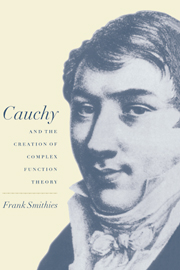Book contents
- Frontmatter
- Contents
- Introduction
- 1 The background to Cauchy's work on complex function theory
- 2 Cauchy's 1814 memoir on definite integrals
- 3 Miscellaneous contributions (1815–1825)
- 4 The 1825 memoir and associated articles
- 5 The calculus of residues
- 6 The Lagrange series and the Turin memoirs
- 7 Summary and conclusions
- References
- Notation index
- Author index
- Subject index
2 - Cauchy's 1814 memoir on definite integrals
Published online by Cambridge University Press: 10 October 2009
- Frontmatter
- Contents
- Introduction
- 1 The background to Cauchy's work on complex function theory
- 2 Cauchy's 1814 memoir on definite integrals
- 3 Miscellaneous contributions (1815–1825)
- 4 The 1825 memoir and associated articles
- 5 The calculus of residues
- 6 The Lagrange series and the Turin memoirs
- 7 Summary and conclusions
- References
- Notation index
- Author index
- Subject index
Summary
2.1. Cauchy's contributions to the development of complex function theory began with his long memoir [1814] on definite integrals; it was presented to Classe I of the Institut de France on 22 August 1814, the day after Cauchy's 25th birthday. The memoir was examined by Legendre and Lacroix, and its publication was recommended in their report [Legendre 1814b], written by Legendre, and dated 7 November 1814. The original intention was that the memoir should appear in the Mémoires présentés à l'Institut des Sciences, Lettres et Arts, par divers savans, but no further issues of this periodical were published because of the reorganisation of the Institut after the the restoration of the Bourbon dynasty. The first volume of the replacement periodical, the Mémoires présentés par divers savans à l'Académie Royale des Sciences de l'lnstitut de France, did not appear until 1827, and did contain both this memoir and Cauchy's prize essay [1815] on the theory of waves.
Because of the long delay in the publication of the 1814 memoir. Cauchy summarised some of its results in various publications between 1814 and 1825 (see Chapter 3 below). By 1823 he was clearly wondering whether it would ever appear in the Academy's publications; in [1823a] he announced that it would probably appear in the next number of the Journal de l'Ecole Polytechnique, but this too was delayed, not being published till 1831, so this scheme did not work.
- Type
- Chapter
- Information
- Cauchy and the Creation of Complex Function Theory , pp. 24 - 58Publisher: Cambridge University PressPrint publication year: 1997



